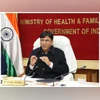Union Health Minister Mansukh Mandaviya on Wednesday directed states and Union territories to chalk out a plan to mitigate heat wave impact, especially for mass gatherings amid the Lok Sabha elections.
Mandaviya, who chaired a meeting to review public health preparedness for management of heat-related illness, highlighted the importance of timely action as soon as IMD alerts are received in states.
"Timely, advance and wide awareness among the people on the preventive measures will hugely support in reducing the severe impact of such heat waves," he said.
The India Meteorological Department (IMD) has recently predicted that the maximum temperature in the country will be above normal for this year.
Since the beginning of April, temperatures of 40 to 42 degrees Celsius have been recorded in many parts of the country, due to which the risk of heat stroke has increased, Mandaviya said.
Also Read
"It is also known that the general election 2024 is at its doorstep in which wide public participation is expected and without public participation this great event will not be complete. While ensuring public participation in this, it is the responsibility of all of us to take care of health," he said.
Keeping the above in mind, a meeting was held with all the stakeholders and instructions have been given to the ministry to take appropriate action immediately in coordination with the states, he said.
He stressed on taking special care of children and the elderly at home.
In case of symptoms of heat stroke, one should go to nearest community health centre, Ayushman Mandir, or consult a doctor in the district hospital, Mandaviya said.
An advisory on heat wave was issued to all the states by the Ministry of Health on February 29, along with which the action plan prepared by the National Centre for Disease Control for the states and Do's and Don'ts for the general public were shared.
"Taking proper care of everyone's health through the above means, we will celebrate this great festival of democracy with full enthusiasm and with wide public participation," he said.
He said state health departments have been asked to ensure training of doctors in rapid assessment of suspected heat stroke cases and standard treatment protocols, along with ensuring availability of sufficient drinking water, general cooling appliances at all health facilities and availability of heatstroke rooms with emergency cooling.
The departments have been urged to ensure that ambulances are equipped with ice packs/cold water for early management of cases.
(Only the headline and picture of this report may have been reworked by the Business Standard staff; the rest of the content is auto-generated from a syndicated feed.)
)